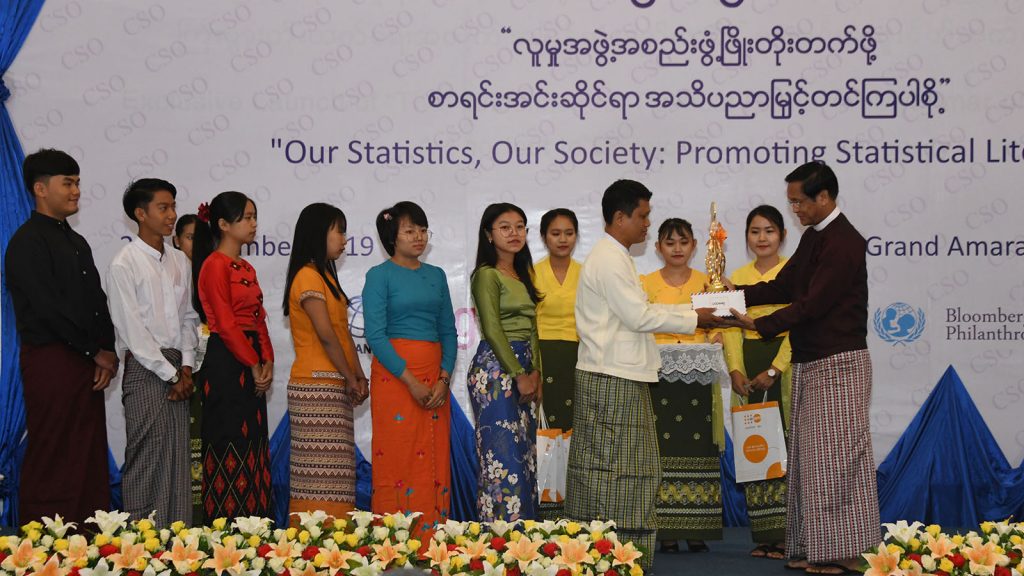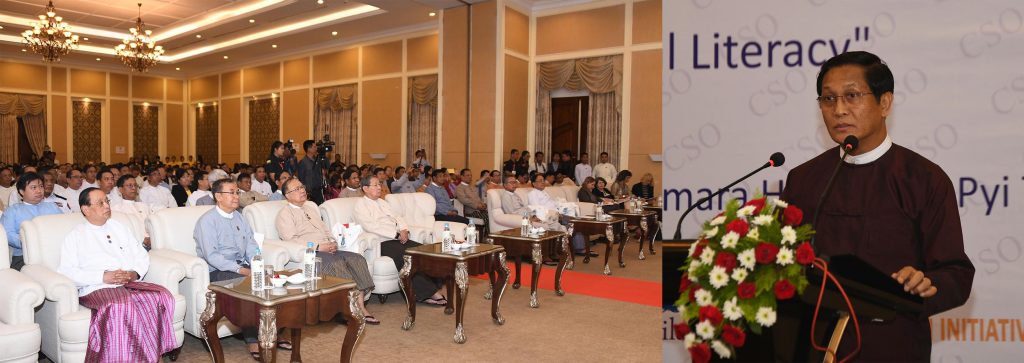Vice President U Henry Van Thio, Chairman of the Central Committee for Accurate and High Quality Statistics addressed the Myanmar Statistics Forum 2019 held at the Grand Amara Hotel in Nay Pyi Taw yesterday morning.
In addressing the forum, the Vice President said that the United Nations Statistical Commission declared 20 October as World Statistics Day and it was celebrated by countries of the world once every five years. Myanmar celebrated it for the first time in 2015. The Myanmar Statistic Forum 2018 was held with the aim of connecting statistics publishers and users, fulfill required statistics and for cooperation among beneficiaries.
The day’s 2019 Forum was held under the theme “Our Statistics, Our Society: Promoting Statistical Literacy” with the aim of knowing the importance of cooperation across all sectors to publish quality statistics in Myanmar and to inform the public of the importance of statistics.
Additional aims of the day’s forum was to educate all level of society from urban to rural to understand the important role of the Statistics Law that came into effect on 22 January 2019, raise the quality of statistic through cooperation across sectors and departments and to raise practical usage of statistics among students by holding Statistics Quiz.
It is very important for both developing and developed countries to have accurate statistics. Consistent, timely, trustworthy and firm statistics are the basis for a country’s development. The private sector especially needs statistics. The country’s political, economic and social conditions are reflected only through quality statistics. Quality statistics are essential and vital to fulfill the requirements of the people, to set practical and firm policies and to identify priority sectors and regions for development.
Furthermore improvements on policies can be conducted. Businesses can conduct better Risk Management when investment decisions are based on correct facts and figures.
The National Strategy for Development of Statistics (NSDS) Action Plan was kept as a Living Document to draw up Statistical Policy Brief, NSDS and NSDS Action Plan according to the Statistic Law and to implement as per the requirement of the time, era and the departments. Every country had established ethics for statistics publishers, users and related person. Myanmar was also striving towards establishing it and all need to abide by it.
Work processes were implemented to be in accord with the Myanmar Sustainable Development Plan (MSDP) 2018-2030 which has been formulated and adopted based on the development needs of the country. Ministries, departments, non-government organizations and development partners were also cooperating towards establishing a National Indicator Framework (NIF) to assess and monitor the implementation of MSDP.
As correct statistics were required in practical projects to raise the socio-economic standard of the people, each government departments needs to cooperate and work together with private sector, research organizations, experts, civil society, development partner organizations and news media.
Connection and coordination between relevant ministerial departments, statistics publishers and users was required to publish correct and effective statistics. Therefore, there is a need for the processes of collecting, collating, evaluating, reporting and publishing to be effective and of full capacity.

Correct and quality statistics reflects the image of the country and increases trust between the government, the people and the international community. Statistics are the historical archives of a country.
For Myanmar to have quality statistics like other countries, the statistics sector needs to develop in accordance with the time and system. Surveys need to be conducted and it was important for the administrative records of departments to be complete, true and include details. Keeping of detailed and systematic records to conduct statistical evaluation should not be viewed as an additional work but viewed as very important work facilitating the smooth running of the government machinery. The Myanmar Statistic Forum is held annually so that a platform could be created to establish a Data Culture not only among the departments but also among the people and private organizations.
As Myanmar is a developing country it was important to invest and effectively use the limited time, money and human resources in the statistics sector. It was important to use quality and true statistics easily and in a timely manner to effectively set up strategies and policies, to implement and monitor projects. For the people to know the importance of statistics according to the theme “Our Statistics, Our Society: Promoting Statistical Literacy” and for statistics to be true and of quality, central committee members, development partner organizations, work groups and stakeholders are urged to participate enthusiastically, said the Vice President.
Next, Central Committee Vice Chairman Union Minister U Soe Win delivered a message of greeting.
Afterwards Central Committee Chairman Vice President U Henry Van Thio, Vice Chairman Union Minister U Soe Win and Union Minister U Kyaw Tin presented awards to student group leaders who won the first, second and third prize in the Statistic Quiz.
The Vice President, Union Ministers, Deputy Ministers, states/regions planning and finance ministers, Hluttaw representatives, Permanent Secretaries, directors general, representatives from local and foreign development partner organizations, panel session participants and Statistic Quiz prize winners then took a commemorative group photo.
The forum was attended by Central Committee for Accurate and High Quality Statistics Vice Chairman Union Minister for Planning, Finance and Industry U Soe Win, Union Ministers U Thant Sin Maung, U Ohn Win, U Win Khaing and U Kyaw Tin, Central Bank of Myanmar Governor, Deputy Ministers, states/regions planning and finance ministers, MPs, governmental officials, statisticians, researchers, representatives from local and foreign development partner organizations. — MNA (Translated by Zaw Min)


